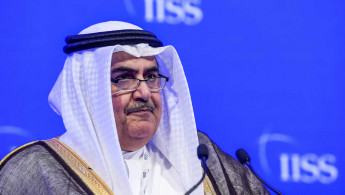Bahrain sought diplomatic ties with Israel, following ministerial meeting
Bahrain told Israel it wanted to normalise ties two years ago, an Israeli TV channel reported on Sunday, following reports last year that Israel was seeking to establish diplomatic relations with the Gulf state.
Bahrain's Foreign Minister Khalid bin Ahmed al-Khalifa secretly met with former Israeli Foreign Minister Tzipi Livni in February 2017, Channel 13 News said according to a Monday report in the Times of Israel.
Khalifa told Livni that Bahrain's King Hamad bin Isa al-Khalifa had decided to begin normalising relations with Israel in the meeting, held during the 2017 Munich Security Conference, unnamed senior Israeli officials told Channel 13.
The Bahraini foreign minister asked Livni to convey the message to Israeli Prime Minister Binyamin Netanyahu, which she then did, sources said.
The Jerusalem Post reported in November 2018 that Israel was seeking to establish diplomatic ties with Bahrain. Khalid denied reports of a planned visit to the Gulf state by Netanyahu, telling Al-Sharq Al-Awsat that the "reality is nothing has happened".
Claims that Bahrain has been pursuing ties with Israel follow similar reports last year of Israeli rapprochement with Arab Gulf states, despite decades of diplomatic boycotts prompted by the mass displacement of Palestinians during the establishment of Israel in 1948 and subsequent occupation of the West Bank and Israel.
Prime Minister Binyanmin Netanyahu visited Oman in October 2018, the first by an Israeli premier to the sultanate in more than two decades.
Two Israeli ministers also travelled to the UAE in 2018.
Israeli Intelligence and Transport Minister Israel Katz said these visits were part of a "wider trend of strengthening ties between Israel and the Gulf countries based on common interests" during a visit to Oman in November 2018, reported the Jerusalem Post.
The Bahraini foreign minister has defended Israeli airstrikes on Iranian targets in Syria, tweeting "as long as Iran continues the current status quo of its forces and rockets operating in the region, any country - including Israel - has the right to defend itself by eliminating the source of danger".
Khalid also expressed support for Israel's operations to find and destroy Hizballah border tunnels between Israel and Lebanon in December 2018.
Saudi Crown Prince Mohammed bin Salman is another Gulf leader who has broken with Arab political tradition by defending Israel. During a visit to the US, Prince Mohammed told The Atlantic that "Israelis have the right to have their own land". He added that the Gulf states and Israel share many common interests.
During Netanyahu's January visit to Chad, he announced that Israel had restored diplomatic relations with the Sahel state and said this was backed by several unnamed Arab states.
The prime minister clearly expressed a desire to press forward with the normalisation of ties with Arab and Muslim states, saying "first you penetrate the Arab world, and that helps you to penetrate the Muslim countries".
Israel announced on Sunday that it would reactivate its "virtual embassy" for the Gulf states, the Jerusalem Post reported. The Twitter account 'Israel in the Gulf' was launched in 2013 but has had no activity since 2014.
The Israeli ministry of foreign affairs tweeted from its Arabic-language account that it hoped "this virtual embassy will contribute to deepening understanding between the Gulf peoples and the people of Israel".





 Follow the Middle East's top stories in English at The New Arab on Google News
Follow the Middle East's top stories in English at The New Arab on Google News


